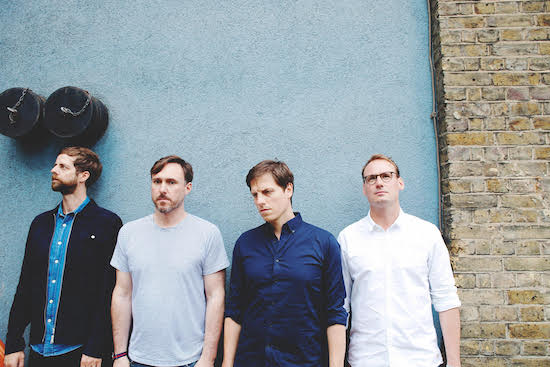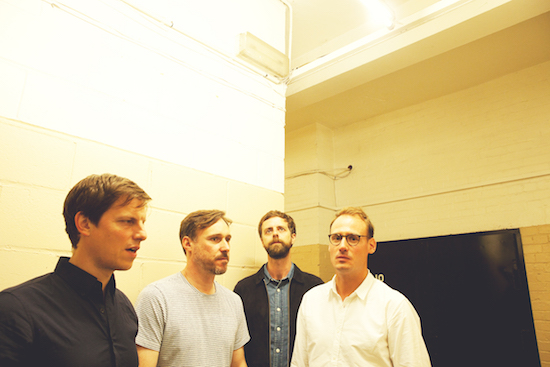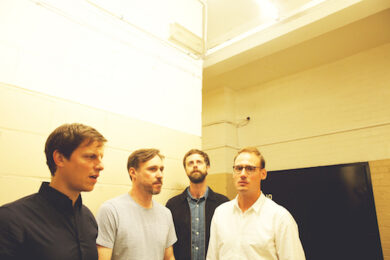The MOTH Club is an ex-serviceman’s venue located down a nondescript side street in the heart of Hackney. While emblematic of the rapid gentrification of the area, it doesn’t deserve to be tarred with the negative connotations that term has come to signify. The front bar has retained the feel of an old-school working men’s club (still frequented by many of the original punters), while out the back, the room that is now run by Lanzarote, the team behind The Shacklewell Arms and The Lock Tavern, is a wonderful mix of contradictions.
Military memorabilia adorns the walls and the notice instructing “No Children on the dance floor after 9.30pm” has been retained. These retro touches are juxtaposed against the expensive refurb job, which includes a glitter-gold ceiling and a state-of-the-art sound system. MOTH is not a reference to the insects belonging to the order Lepidoptera, but instead an acronym for Memorable Order of Tin Hats, a charitable organisation set up in 1927 in South Africa to help support fellow comrades in need. In keeping with its roots, the venue still puts on bingo, quiz and cabaret nights, but it is in its guise as a live music venue that it is operating tonight, hosting the second coming of The Early Years, the London/Cheshire experimental rock quartet, who are back with their second album, a mere ten years after their self-titled debut.
It’s a Monday night, three days after the referendum vote that will result in Britain’s exit from the European Union (if only there was a handy abbreviation for that) and the MOTH Club’s roots in traditional British heritage makes it an apt location for the post-mortem conducted between myself and Phil Raines (drums/electronics) and Roger Mackin (guitar/occasional vocals) from The Early Years.
Of course, we’re supposed to be discussing their (excellent) new album, simply titled II, but it’s hard to keep our minds on the task at hand when emotions are still so raw. It doesn’t help that on a TV in the background there’s another abject exit from Europe taking place, as the England national team are expunged from Euro 2016 by a team from a volcanic island with a population the size of Coventry. You get what you deserve, but it’s a downbeat backdrop for what should be the triumphant return of one of the best live bands in the country. “We couldn’t have picked a worse night,” laments Mackin. “A Monday night, the football’s on…”
The day after the referendum, the band rush-released the first single from the new record, ‘Nocturne’, a raw blast of electronic-rock, mixing analogue synths with searing guitars, pummelling drums and the vocal refrain, “A chance, a chance, a lie, a lie…” Despite being written way in advance of the events that unfolded, it felt like a very political and angry song that would have chimed with the mood of anyone waking up on that Friday morning who felt cheated by the way the referendum vote went.
“It was supposed to be released today to coincide with this gig,” Raines explains, “but we all woke up thinking, ‘What the fuck just happened?!’, and we were listening back to the song and it seemed so fitting. So Dave [Malkinson, guitars/vocals] emailed Nat [Cramp, Sonic Cathedral head honcho, whose label will release II in September] and said, ‘Let’s just get it out and see what happens.’ It seemed to be the right time. It was bizarre. You can read so much into the lyrics. The result was a real shock. It doesn’t seem like anything positive is going to come out of it.”
“I felt like someone had died,” Mackin continues. “I think Noel Gallagher is a massive knob jockey, but he said something along the lines of that we pay to have a government, so they should decide what we do. You didn’t ask us if we wanted to go to war in Iraq, you didn’t ask us if we wanted to bomb Syria – most of the population are thick, so why ask us to make this massive decision? It’s all a Westminster game.”

So what is ‘Nocturne’ actually about? “It’s about Dave’s confused mind,” says Mackin. “It’s more of an existential song than about anything in particular. It’s a rant about nothingness – about what he wants and who he is."
The strong wills of individuals led to conflict within the band after the release of their first album in 2006. It was well-received without setting the world on fire, and there was a difference of opinion between the various factions as to what direction they should take next; the classic “creative differences” that divides so many bands who take a nuanced and considered approach to making music.
“We went back into the studio in 2008 to make the second record,” reveals Raines. “It didn’t really work. We were trying loads of stuff out. I was really into synths and drum machines and wanted to make an electronica record akin to Cluster’s Zuckerzeit. Others wanted to produce a song-orientated record. We had real difficulty reconciling the two.”
“We’d bought loads of analogue synths and vintage gear and no one knew how to use it,” continues Mackin. “We were rehearsing for eight hours a week and six hours would be working out what all the different buttons did. I just thought, ‘I can’t do this. I’m not enjoying the way it’s going.’ I love electronic music, but I didn’t like all the fiddling about. I wanted to be in a band.”
There are similarities (albeit on a different scale, fame-wise) with what happened to Radiohead post-OK Computer. Suffering from writer’s block, Thom Yorke insisted that the band put down their guitars, replacing them with an abstract palette of synthetic sounds influenced by the progressive electronica of acts such as Autechre and Aphex Twin. Eventually, everyone got on board with Yorke’s vision, but there was a point where some band members were spending most of their day puzzling over instruction manuals for different bits of electronic gear. One, I can’t remember which, likened the early stages of making Kid A to “working in [defunct electronics retailer] Tandy”. Sick of the “endless synth noodling”, Mackin downed tools during these sessions and told the band he’d come back when they got tired of it and wanted to make a proper Early Years record.
In the interim, Malkinson, Raines and bassist Brendan Kersey formed a side project – zer0set – to indulge their love of improvisation and electronic music. Gigs were sporadic, but spoken of in glowing terms by anyone lucky enough to catch them. Occasionally Mackin would join in, and new songs started to form that bore the hallmarks of the original Early Years sound and this bold new direction. So despite the gap between albums, the band never actually split up. A couple of singles under The Early Years moniker were released on Sonic Cathedral, but a new album seemed unlikely. Then the band headlined a sold-out 100 Club in 2014 to mark Sonic Cathedral’s 10th anniversary, shortly after performing at the Liverpool International Festival of Psychedelia. This time they continued that momentum into a full-blown reunion. Raines reveals that without Cramp’s constant badgering for them to get back in the studio and record some new material, II would probably not have seen the light of day.
“A lot of the seeds for this album come from stuff that Dave and Phil started a few years ago,” says Mackin. “The first time I listened to it, I just thought, ‘There’s nothing there for me.’ But then I listened to it again and again and I started having ideas – put a vocal there, put a guitar there, then that could be a really good song.”
“About two or three tracks are from that period,” Raines adds. “We then stuck them through the Early Years machine and re-recorded bits, edited stuff, remixed it, put Roger’s guitar on there. We’ve ended up with fully formed Early Years songs.”
The bulk of II was recorded in an outbuilding at the bottom of Malkinson’s garden in Cheshire, with the rest done at Phil’s studio in his house in Tulse Hill, London. The advantage of Malkinson’s set up in Cheshire was an absence of neighbours, enabling the band to make as much noise as they wanted, and also – crucially – the space to explore and record new ideas without the monetary pressures of a regular studio.
“We’d go down to Aldi and buy £4 Toro Loco bottles of red wine,” reveals Mackin. “There was a fire pit outside. We’d just press record and off we’d go. We could play until dawn if we wanted.”
“It was pure self-indulgence,” agrees Raines. “At first we were just doing it for the pleasure of making music. In the time we’ve had off between the two albums, we’ve been able to really learn our craft. We’ve learnt how to produce ourselves, how to use Pro-Tools, how to use compression, how to EQ, mic placement… So when it came to actually record the second album, we were completely self-sufficient. We didn’t need a producer because technically we knew what we were doing. And that’s given us so much freedom.”
II was self-produced but the band did call in the services of an engineer. Raines first approached John McEntire of Tortoise to do it, but it clashed with the release of the new Tortoise album, so they instead turned to Jason Kingsland, the engineer on Deerhunter’s Fading Frontier, an album the band were big fans of.
“I dropped him an email and he responded straight away,” Raines reveals. "He loved the sound of it and was really keen. He’s based in Atlanta, Georgia, so initially I thought I’d email over the files and he’d mix it and send it back. But in his studio he’s got an awesome streaming set up, so he can be in his studio and the music goes directly through his rig and he can stream it to anybody. I was sat in my studio at home and the audio from Jason’s studio was coming out of my studio monitors, so I could say, ‘Turn the bass up’ or ‘Add this reverb effect’. We could do it real-time even though we were in completely different places.”
“It was amazing,” Mackin says. “I was in my flat in Bethnal Green, Phil was in Tulse Hill, Dave was in Cheshire and Brendan was up in Walthamstow and we could all have input.”
“It really worked,” continues Phil. "It sounds like it could be a nightmare to do it that way but it was actually really effective. We’ve ended up with a record that sounds exactly how we wanted it to. Jason put us on to Frank Arkwright at Abbey Road and he mastered it. Again, he was brilliant."
As well as cheap red wine and a relaxed creative environment, II was recorded under the influence of Steve Reich, Kraftwerk, Neil Young, Television, Emeralds, Suicide, Bowie’s Low and Lodger, The Idiot by Iggy Pop and The Walker Brothers’ Nite Flights. Yet despite the band being on the same page musically, and with all members contributing equally to the direction and sound of the album, there are still differences of opinion over the benefits of the extended hiatus.
“I’ve got massive regrets that we left it so long between albums,” says Mackin. “I feel like we could easily have done what we’ve done now, eight years ago.”
Raines begs to differ: “I don’t think we were musically or technically mature enough to achieve what we’ve achieved. I don’t think we’d have made the record we’ve got today if we’d carried on.”
“Perhaps we weren’t mature enough as people,” Mackin concurs. “Everyone had too much pride…”
“And too much of an agenda,” Raines continues. “You start shedding a lot of crap as you get older – pride, ego. I don’t regret a thing. We never lost our friendship. Musically it disintegrated, but we’d still get together and hang out. There was never any malice.”
This harmony and sense of collective purpose is immediately apparent when the band takes to the stage at the MOTH Club in the aftermath of England’s humiliation at the feet of Iceland. They are joined by a fifth member, Alex Theakston, a modular synth geek who writes about equipment for Future Music magazine and has been entrusted with adding the electronic elements to augment the robust live sound.
The set is short in terms of number of tracks played (seven), but not in duration, bolstered by the final track, an incendiary 20-minute rendition of ‘The Simple Solution’ from their debut, which sees the band coming on like a Neu!/Hawkwind hybrid. Not for nothing did Brian Eno once compare the style and energy of Raines’s drumming with that of Neu!’s Klaus Dinger, while the former Can frontman Damo Suzuki utilised the services of the band to be his “sound carriers” for an improvised gig in 2006.
Mackin’s treated guitars and experimental style of playing has echoes of Johnny Greenwood, while Malkinson is a confident, compelling frontman, his deep, evocative baritone resonating like Closer-era Ian Curtis. Meanwhile, Kersey’s sinewy, fluid basslines are a key component of the band’s sound. The new songs sit perfectly alongside old favourites such as ‘All Ones And Zeros’ and the aforementioned ‘The Simple Solution’, with ‘Nocturne’ delivered with venom and power, Theakston’s pulsing synth-lines bringing a snaking groove to the mix. Throughout the set, pre-recorded drones provide additional texture and warmth.
It’s a welcome return for The Early Years, who have drawn a decent crowd despite Mackin’s fears over the scheduling of the gig, including one ardent fan who has travelled down from Cheshire specially having been trying (and failing) to see the band perform for more than six years. However, despite confidence in the record and the band’s abilities, Raines is still wary of how their comeback will be received. "We’re a band that hasn’t really done anything for a decade," he muses. "This album, for me, completely outstrips the previous one, but are people going to be able to find it? Is it just going to evaporate into the ether? In this day and age you just don’t know."
Whatever happens, it seems that the band are determined to not leave it quite so long before they release album No 3. "It’s all about keeping the momentum going now," says Mackin. "We’ll do a tour around this album and then we’re all ready to do the next one."
II is released by Sonic Cathedral on September 23. The Early Years play at the Supernormal Festival in Oxfordshire on August 6, and at the Liverpool International Festival of Psychedelia on September 24



